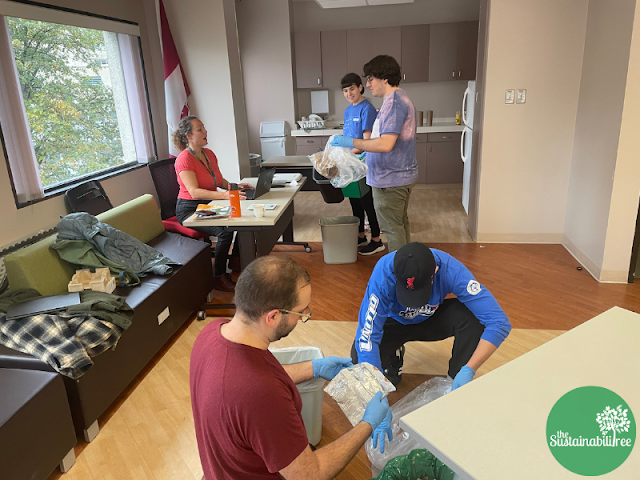This semester, as part of the Green Reps, I learned a lot about waste, recycling, and compost. As part of the program, I participated in a composting campaign and audit in the Dining Hall. This will be a two part blog, where I first talk about the problems of food waste, and then I'll share my experience volunteering in uOttawa's Dining Hall. To start off, when I talk about food waste, I mean what is edible food that is not eaten, but instead is discarded into the compost or landfill. I am not talking about the smaller percentage of items that is inedible such as bones or banana peels. How Bad is Food Waste Really? Food waste is one of the top contributors of greenhouses gasses and a huge source of emissions causing climate change. When food is wasted, it releases a gas called methane as it decomposes. This gas is extremely harmful to the atmosphere and has a large impact on the environment as well as the food supply chain, cost of food, and food security (Sanders, 2021). Wo...
Search Blog
Hit enter to search or ESC to close
Featured Posts
Showing posts with the label waste audit
Posts
- Get link
- X
- Other Apps
Posted by
Holly Gordon
Lamoureux's Recycling Reality: Are We Doing It Right?
The Faculty of Education's EcoClub set out to uncover the truth behind our recycling habits, and the results were were eye-opening. Digging into the Waste Audit In late October, a dedicated group of professors and teacher candidates joined forces with Facilities to conduct a waste audit of Lamoureux, the Faculty of Education's main building. A waste audit may sound a bit technical, but it's simple: we collected all the garbage, tracked where each bag came from, and then weighed and sorted the contents. This hands-on approach allowed us to see what people are really recycling and composting, as opposed to what could be properly sorted and recycled. Before we dive into the nitty-gritty of our findings, let's address why this matters. Sending compostable organics to a landfill is not just bad for the environment; it's contributing to the climate crisis. And when recyclable items end up in the wrong bin, it's a tremendous waste of valuable resources in a worl...
- Get link
- X
- Other Apps
Posted by
Holly Gordon
Does uOttawa Have a Waste Sorting Problem?
My first week living in Canada was spent sorting through trash, and I am so glad I had the chance to do it! As a new graduate student at the University of Ottawa, I made the decision to leave my job in Boston and make the move up to Ottawa during Reading Week. While looking for ways to hit the ground running, I found the Alternative Study Break program, and decided to spend my week volunteering with the Office of Campus Sustainability. We were tasked with performing a waste audit on the Friel Residence, then collecting and analyzing the data. Talking about the issues with waste, collection, and contamination was an eye-opening experience and having the opportunity to see for myself the amount of waste that is produced by one building felt like an urgent wake-up call. We found a staggering amount of waste contamination, as recycling and garbage were often placed in the incorrect streams. Surprisingly, the majority of waste was incorrectly placed, and this carries significant implication...
- Get link
- X
- Other Apps
Posted by
uOttawaSustain
Waste Audit in the Fauteux building
What is a waste audit? Well my friends, a waste audit is when we organize the collection of all the waste and recycling from a given space (all the bags are labeled by room and waste type i.e. recycling mixed papers room 229), and we evaluate the contents of each bag. Each bag is opened and the items inside are separated by type (mixed papers, waste, etc.) and weighed. With the information noted during the waste audit, we can calculate the contamination rate of each bag, and of the whole building (i.e. the percentage of items which were in the wrong receptacle). We can then study trends in the data; for example, if people are often throwing a specific item in the wrong bin it is perhaps because the bin isn’t labeled properly, or the sings aren’t clear enough. Recently, we completed a waste audit of the entire Fauteux building, and here are the results: 32% of what was found in each bag was considered to be some type of contamination (which is above what is usual for campus buildings…)....
Posted by
uOttawaSustain
Une Vérification de déchets au pavillon Fauteux
Qu’est-ce qu’une vérification de déchets ? Bien les ami(e)s, une vérification de déchets est lorsqu’on organise la collecte de déchets et recyclage (tout identifié par type et endroit ex. recyclage de papier, comptoir de recyclage devant salle 323) d’un endroit, lors d’une période de temps et que l’on évalue ce qu’il y a à l’intérieur de chaque sac. Chaque sac est ouverts et les articles sont triés et pesés par type (papier, déchets, etc.). Avec toutes les quantités notées nous pouvons calculer le taux de contamination de chaque sac, c'est-à-dire, le pourcentage des articles qui ne devraient pas être dans ce sac (ex. des déchets dans le réceptacle pour le métal/plastique/verre). On peut par la suite étudier les résultats et trouver des tendances ; Si par exemple tout le monde jette un article recyclable en particulier c’est peut-être parce que ce n’est pas bien indiqué sur les affiches ! Récemment, nous avons compléter une vérification de déchets de l’édifice Fauteux en entier, et...
- Get link
- X
- Other Apps
.png)



